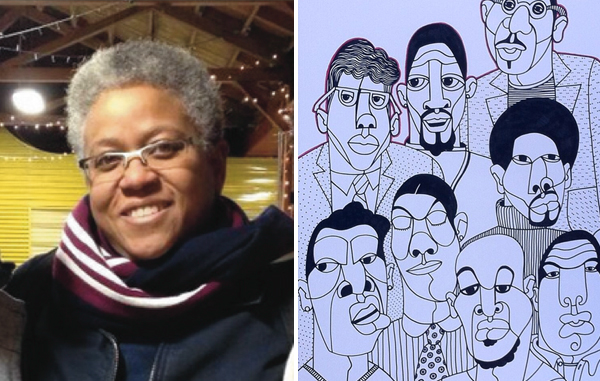
Successful artist, published author and respected professor, Ajuan Mance is an African American Literature specialist who has been inspiring students at Mills since 1999 as a professor of English.
Originally, Mance’s focus was in women’s poetry, until one of her dissertation advisors dubbed her an African American literature specialist after he reviewed her dissertation about the topic. Although Mance has always been interested in literature, it was this push that allowed her to pursue it.
“[He told me] this is what I see, and you have a lot of good things to say; this is what you should be doing,” Mance said. “And it turned out he was right.”
When Mance was an assistant professor at the University of Oregon, she longed for a more urban environment. So when the opportunity to apply to work at Mills came along, she had to take it.
“I decided to come to the campus, and I met the faculty, and I just thought: this is where I need to be,” Mance said.
Mance currently is honored with the May Treat Morrison Chair for American History, one of Mills’ endowed chairs, a three year term allowing chosen professors to teach one less class per semester to devote more time to work on personal research projects. Mance is using this time to work on an anthology of nineteenth century black writers and get it published. She now uses some of the content she’s discovered for the anthology in her 19th Century African American Literature class.
“Once I started doing research, it completely changed my nineteenth century course,” said Mance. “Now almost all of what we read in that course is stuff that isn’t even in print.”
Shanna Hullaby, former student and teacher’s assistant to Mance, said not only is she an inspirational teacher, but also a transcendent mentor.

“I had never seen a teacher that was so smart and knew so much about their subject matter,” Hullaby said.
Mance has always gotten excited about discovering new writers, and in her teachings it’s her excitement that really inspires students.
“I think sometimes it takes you a couple of years as a professor to realize that there are the things you need to teach,” she said. “But in the end the teaching just has to come out of what excites you.”
For Mance, the book that sparked this excitement was Toni Morrison’s “Song of Solomon.” Although the first few times she attempted to read the book she admittedly couldn’t make it past the first 75 pages, she eventually assigned the book to a class she taught in grad school. After she got through those pages, she couldn’t put it down.
“When I closed the book it made me feel happy and privileged to be a black person,” Mance said. “I had never had that experience with a book.”
In addition to African American Literature, Mance is also passionate about art. Mance has a unique style of artwork that she applies to a particular subject matter–black men. For Mance, the impact her work has on African American viewers is particularly interesting.
Her current project, “1001 Black Men” is an online sketchbook and series of drawings of black men that she scans and adds color and special effects to, which gives it a stained glass look; which was actually the inspiration for her style.
“I think we are so concerned about, especially with certain generations, our representation,” Mance said. “Our image has been used to do so many not nice things to us, and say so many bad things about us. It almost makes people nervous just to see so many representations of black people.”
According to Mance, drawing African American images is loaded. While her style is sometimes controversial, she understands that there is a suspicion and a little bit of fear over them: will this help or will this hurt. But she believes that it is important to emancipate yourself from what other people think about your image.
“When you start to use a graphic design or street style, I think that [it] can make people a little bit nervous because everyone thinks we are already cartoonish or everyone thinks we are only worthy of street art,” Mance said.
Mance has also always been interested in masculinity as a subject and the ways in which maleness is represented with and without masculinity.
“I think male beauty is something that is very profound,” Mance said. “But its not drawn as much. Even a lot of women will draw women as opposed to men and I feel like masculinity is so much more interesting,” Mance said.
Although Mance’s artwork and her literary career seem like separate entities, she connects them in her classroom with her passion for dissecting African American cultures and how they became what they are. At Mills, Mance integrates both of her passions into the classroom by using the inspiration she has found in her research to reach her students and form her own vibrant literary community.

